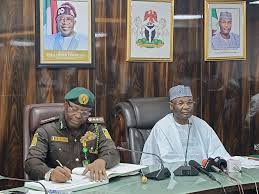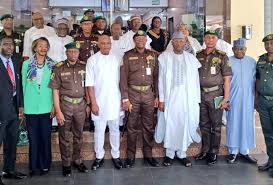
Daniel Otera
Nigeria is moving closer to granting voting rights to eligible inmates, a reform that could reshape electoral participation and deepen democratic inclusion.
The push, led by the Independent National Electoral Commission (INEC) in partnership with the Nigerian Correctional Service (NCoS), focuses on prisoners awaiting trial who, under the law, retain their civic rights.
The debate gained momentum after the Controller General of the NCoS, Sylvester Nwakuche, paid a courtesy visit to INEC headquarters in Abuja. INEC Chairman Prof Mahmood Yakubu used the occasion to confirm that the commission is developing a framework to allow inmates who meet the legal criteria to vote in future elections.
“We are aware that the right to vote is a human right which cannot be taken away from a citizen on account of time being served in a correctional facility,” Yakubu said, citing both global and Nigerian legal provisions that support the move.
The NCoS reports that as of July 2025, Nigeria’s correctional facilities held 81,558 inmates, of whom 53,473 were awaiting trial. In April 2025, BusinessDay put the figures even higher 82,847 inmates, with more than 56,000 awaiting trial. This group, often detained for years without conviction, forms a significant potential voting bloc.
Yakubu referenced Article 25 of the International Covenant on Civil and Political Rights (1966), which guarantees citizens the right to participate in public affairs, including voting, without unreasonable restrictions.
Within Nigeria, Section 25 of the 1999 Constitution defines citizenship rights, which courts have interpreted to include voting for certain categories of inmates. Two landmark cases cemented this position: a Federal High Court ruling in Benin on 16 December 2014 and a Court of Appeal judgment in the same city on 7 December 2018. Both cases, brought by awaiting-trial inmates, affirmed that incarceration without conviction does not extinguish voting rights.

“The judges ruled that the right to vote is only exercisable when asserted, as it is a choice to be exercised voluntarily by a citizen and not a duty to be imposed by force of authority,” Yakubu explained.
Former senator Shehu Sani, who once represented Kaduna Central and has personal experience as a prisoner, welcomed the reform as “a commendable democratic reform.”
However, in a post on his official X account, he warned of the internal power structures within prisons.
“Speaking from experience as an ex-prisoner, I know that the long-term serving inmates and the ‘Cell Governors’ and their Exco will control the votes,” he wrote, referring to informal leadership hierarchies that can influence prison life. “The order of command inside the prison cell is not for the weak.”
INEC has looked to other African countries for examples. In South Africa, about 15,000 prisoners voted in the 2019 general elections, according to the Associated Press. In Kenya, the Independent Electoral and Boundaries Commission uses mobile polling stations inside prisons, allowing eligible inmates to cast ballots securely. Ghana also has a functioning prison voting system.
INEC registered 93.47 million voters ahead of the 2023 general elections, up from 84 million in 2019. Yet only about 25 million Nigerians voted with a turnout of 26.7 percent, the lowest since the return to democracy in 1999.
